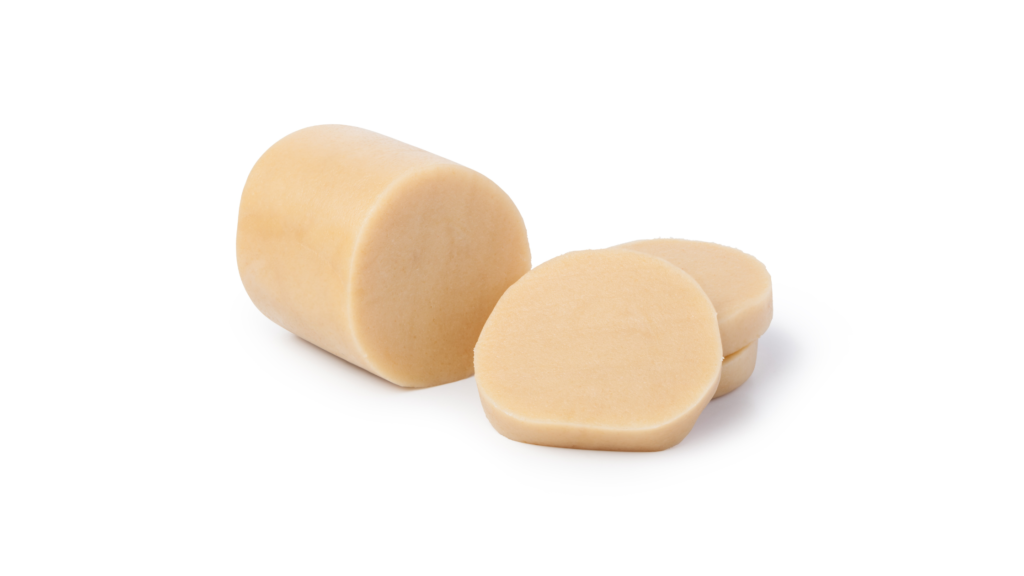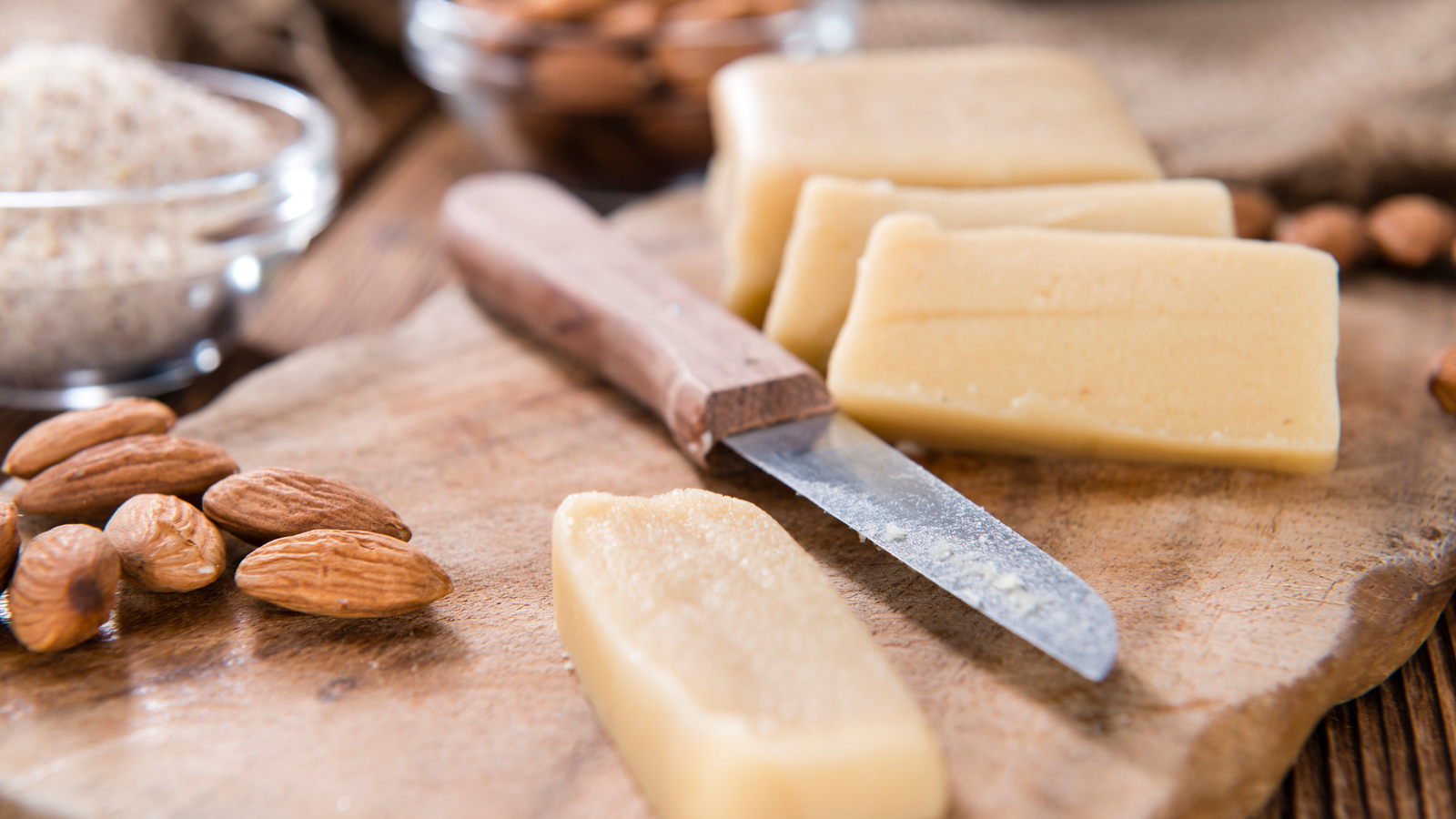Can Dogs Eat Marzipan? As a dog owner, being mindful of what your furry friend eats is important. While sharing your favorite sweet treats with your pup may be tempting, certain foods can be dangerous or even deadly for dogs.
One such food is marzipan, a sweet almond paste often used in desserts. In this article, we’ll explore whether dogs can safely eat marzipan and what you should do if your dog accidentally ingests this confection.
What is marzipan, and why is it popular in desserts?

Marzipan is a sweet almond paste commonly used in various desserts, such as cakes, pastries, and candy.
It is made by blending ground almonds with sugar or honey to create a thick, malleable paste that can be shaped into various forms.
Marzipan has been used in European desserts for centuries. It is popular in traditional holiday treats like stollen, panettone, and yule logs.
Marzipan is popular in desserts for several reasons:
- It has a sweet and nutty flavor that complements various other ingredients, including chocolate, fruit, and spices.
- Marzipan is easy to work with and can be molded into various shapes and designs, making it a versatile ingredient for bakers and pastry chefs.
- Marzipan is often used as a decorative element in desserts, adding visual appeal and a unique texture to the finished product.
However, while marzipan is a beloved ingredient in many desserts, it is important to know that it can be toxic to dogs if ingested in large quantities.
Therefore, it’s important to keep marzipan and other human sweets out of reach of pets to avoid any potential health problems.
Can dogs eat marzipan? Is Marzipan safe for dogs?

While marzipan is not considered toxic to dogs, it is not recommended to feed it to them.
Marzipan is a high-sugar and high-fat food that can cause digestive problems and weight gain in dogs.
Additionally, some marzipan products may contain other ingredients that are harmful to dogs, such as chocolate or xylitol.
It will likely be okay if your dog accidentally eats a small amount of marzipan.
However, if they consume a larger quantity, they may experience symptoms such as vomiting, diarrhea, lethargy, and loss of appetite.
In rare cases, marzipan toxicity can lead to serious health problems like pancreatitis.
Therefore, it is best to avoid giving marzipan to dogs altogether and to keep all sweets and desserts out of reach of your furry friends.
Suppose you suspect your dog has eaten marzipan or any other potentially harmful food.
In that case, it’s important to contact your veterinarian immediately for advice on how to proceed.
The dangers of marzipan for dogs
While marzipan is not inherently toxic to dogs, it can still pose several health risks if consumed in large amounts. Here are some of the most common risks associated with feeding marzipan to dogs:
Digestive Problems: Marzipan is high in sugar and fat, which can cause digestive upset in dogs. Consuming large amounts of marzipan can lead to symptoms such as vomiting, diarrhea, and abdominal pain.
Also Read: Can Dogs Eat Abalone? Best Tips for Safely Feeding Abalone
Weight Gain: Like most sweets, marzipan is calorie-dense and can contribute to weight gain in dogs if consumed regularly or in large amounts.
Xylitol Poisoning: Some marzipan products may contain xylitol, a sugar substitute that is highly toxic to dogs. Even small amounts of xylitol can cause a rapid release of insulin in dogs, leading to dangerously low blood sugar levels and potential liver failure.
Chocolate Toxicity: Some marzipan products may be coated in chocolate, which is highly toxic to dogs. Chocolate contains theobromine, which can cause symptoms such as vomiting, diarrhea, tremors, seizures, and even death in dogs if consumed in large amounts.
Pancreatitis: Consuming large amounts of fatty foods like marzipan can increase the risk of pancreatitis in dogs. Pancreatitis is when the pancreas becomes inflamed, leading to symptoms such as abdominal pain, vomiting, diarrhea, and lethargy.
Overall, it is best to avoid feeding dogs marzipan and keep all sweets and desserts out of reach of pets.
Suppose you suspect your dog has eaten marzipan or any other potentially harmful food.
In that case, it’s important to contact your veterinarian immediately for advice on how to proceed.
Symptoms of marzipan toxicity in dogs
Marzipan itself is not toxic to dogs, but if your dog consumes a large amount of marzipan or marzipan-containing products, it may experience symptoms of toxicity. Here are some of the signs to look out for:
Digestive upset: Consuming a large amount of marzipan can cause digestive upset in dogs, leading to vomiting, diarrhea, and abdominal pain.
Lethargy: Dogs who have consumed a lot of marzipan may become sluggish or unresponsive.
Loss of appetite: Marzipan toxicity can cause dogs to lose their appetite and refuse to eat.
Increased thirst and urination: Dogs who consume much marzipan may drink more water and urinate more frequently.
Pancreatitis: Marzipan is high in fat and can increase the risk of pancreatitis in dogs. Symptoms of pancreatitis include vomiting, diarrhea, abdominal pain, and lethargy.
Suppose you suspect your dog has consumed a large amount of marzipan or any other potentially toxic substance.
In that case, it’s important to contact your veterinarian immediately. They can advise on managing your dog’s symptoms and preventing further complications.
Sometimes, your vet may recommend hospitalization and supportive care to manage your dog’s condition.
What to do if your dog eats marzipan
It will likely be okay if your dog has eaten a small amount of marzipan.
However, suppose they have consumed a large amount or are showing symptoms of marzipan toxicity.
In that case, it’s important to take action quickly. Here are the steps you should take if your dog eats marzipan:
Monitor your dog’s symptoms: Monitor your dog for signs of digestive upset, lethargy, loss of appetite, increased thirst and urination, or other symptoms of marzipan toxicity.
Contact your veterinarian: If your dog has consumed a large amount of marzipan or is showing symptoms of toxicity, contact your veterinarian immediately. They can advise on managing your dog’s symptoms and whether further treatment is necessary.
Supportive care: Depending on your veterinarian’s recommendations, you may need to provide supportive care for your dog. This may include offering small amounts of water to prevent dehydration or withholding food until your dog’s digestive system has had a chance to recover.
Follow your veterinarian’s recommendations: Your veterinarian may recommend additional treatment or monitoring for your dog, depending on the severity of their symptoms. Follow their recommendations closely to ensure your dog receives the care they need.
In general, it’s best to keep all sweets and desserts out of reach of your pets to prevent accidental ingestion.
If you suspect your dog has consumed a potentially harmful substance, don’t hesitate to contact your veterinarian for advice on how to proceed.
Also Read: Can Dogs Eat Barbacoa? Is Barbacoa safe for puppies?
Conclusion
In conclusion, while marzipan is not inherently toxic to dogs, it can pose several health risks if consumed in large amounts.
Marzipan is high in sugar and fat, which can cause digestive upset and weight gain in dogs.
Some marzipan products may also contain xylitol, a sugar substitute that is highly toxic to dogs, or be coated in chocolate, which is also toxic.
Ingestion of large amounts of marzipan can increase the risk of pancreatitis, a serious condition that requires veterinary treatment.
Suppose you suspect your dog has consumed marzipan or any other potentially harmful substance.
In that case, it’s important to contact your veterinarian immediately for advice on how to proceed.
By taking prompt action, you can help minimize your pet’s health risks and ensure they receive the care they need.
As a responsible pet owner, it’s important to keep all sweets and desserts out of reach of your pets to prevent accidental ingestion and potential health complications.

